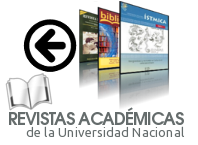José Martí and his thinking in the sciences
DOI:
https://doi.org/10.15359/tdna.40-76.2Keywords:
science, technique, thought, development, society, compilationAbstract
If we delve into the conceptions of science and technology that José Martí bequeathed us, we appreciate that each of them has considered, in its historical moment, the significance it has for the development of society. The purpose of this article is to reflect, through a bibliographic review, on José Martí’s thinking in science, which includes his updated information and guiding dissemination of the advances in science and technology of his time and today. The objective of the work presented is to present a brief compilation of Martí’s thoughts in the sciences, demonstrating that the same line of thought exists. The materialist dialectic of Marxism-Leninism was assumed as the guiding method, using theoretical and empirical methods. The essential theoretical postulates are systematized that allow establishing fundamental concepts and theoretical positions, basing the lucidity and sensitivity of José Martí with respect to the paths of technological development of his time and environment, the ability to unravel truths, to make sense of things, in all the domains of knowledge he dealt with, stating that he was a man of science and that the validity of Martí’s scientific thought is increasingly greater in our times
References
Crespo P., O. (2011). Martí, un hombre de ciencia. Recuperado de http://www.cubadebate.cu/
Gallardo L., T. (2001). Martí y la ciencia. Recuperado de http://www.cubadebate.cu/
Martí, J. (1975). Cartas a María Mantilla. En: Obras completas. Tomo 20. 2.a ed. Editorial Ciencias Sociales, La Habana.
Martí, J. (1975). Educación científica. En: Obras completas. Tomo 8. 2.a ed. Editorial Ciencias Sociales, La Habana.
Martí, J. (1975). “El Proletario” de Castillo Velasco. El papel barato. La utilidad del sistema prohibitivo. Revista Universal. En: Obras completas. Tomo 6. 2.a ed. Editorial Ciencias Sociales, La Habana.
Martí, J. (1975). Escasez de trabajo. Raza indígena. Hay mal accidental y esencial. La prisión de Cortina. Porvenir de México. Revista Universal. En: Obras completas. Tomo 6. 2.a ed. Editorial Ciencias Sociales, La Habana.
Martí, J. (1975). Escuela de electricidad. En: Obras completas. Tomo 8. 2.a ed. Editorial Ciencias Sociales, La Habana.
Martí, J. (1975). Exposición de electricidad. Obras completas. Tomo 8. 2.a ed. Editorial Ciencias Sociales, La Habana.
Martí, J. (1975). Guatemala. En: Obras completas. Tomo 7. 2.a ed. Editorial Ciencias Sociales, La Habana.
Núñez, J. (1999). La ciencia y la tecnología como procesos sociales. Lo que la educación científica no debería olvidar. Recuperado de http://www.campus-oei.org/ctsi/catedra.htm
Toledo B., J. (2003). La ciencia y la técnica de José Martí. 2.a edición. Editorial científico-técnica, La Habana.
Valdés, R. (2002). Diccionario del pensamiento Martiano. Editorial Ciencias Sociales, La Habana.
Downloads
Published
How to Cite
Issue
Section
License
Copyright (c) 2024 Temas de Nuestra América Revista de Estudios Latinoamericanos

This work is licensed under a Creative Commons Attribution-NonCommercial-NoDerivatives 4.0 International License.
Esta obra de Revista Temas de Nuestra América está bajo una Licencia Creative Commons Atribución-NoComercial-SinDerivar 4.0 Internacional.
Cualquier permiso que trascienda dicha licencia, debe solicitarse por escrito a la persona directora de la Revista










